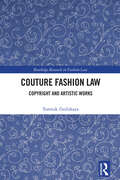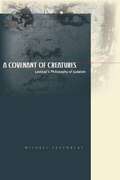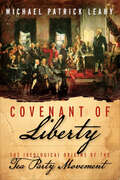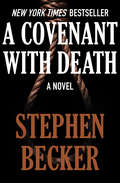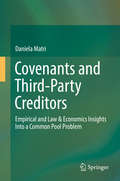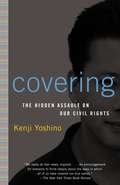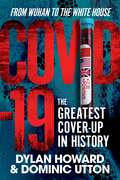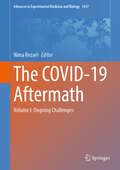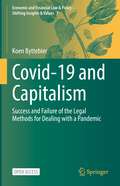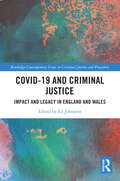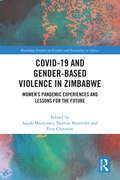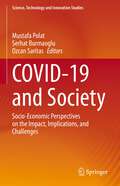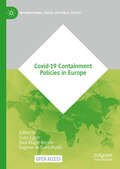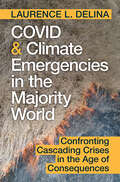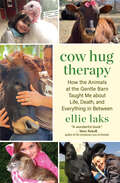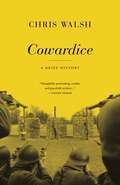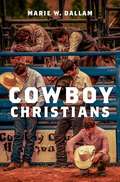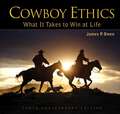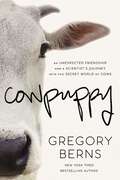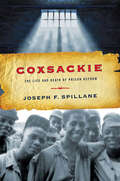- Table View
- List View
Courts without Borders
by Tonya L. PutnamCourts without Borders is the first book to examine the politics of judicial extraterritoriality, with a focus on the world's chief practitioner: the United States. For much of the post-World War II era, the United States has been a frequent yet selective regulator of activities outside its territory, and US federal courts are often on the front line in deciding the extraterritorial reach of US law. At stake in these jurisdiction battles is the ability to bring the regulatory power of the United States to bear on transnational disputes in ways that other states frequently dislike both in principle and in practice. This volume proposes a general theory of domestic court behavior to explain variation in extraterritorial enforcement of US law, emphasizing how the strategic behavior of private actors is important to mobilizing courts and in directing their activities.
Couture Fashion Law: Copyright and Artistic Works (Routledge Research in Fashion Law)
by Tomruk ŰstűnkayaThis book provides an insight into the legal workings of the most ostentatious fashion sector, Couture, whilst simultaneously advocating for stronger legal protection in this industry.Offering an interdisciplinary approach, including art theory from Tolstoy and Rand amongst others, the book examines where Couture fashion sits within the law. Most significantly the book considers the couturier as an ‘artist’ and Couture as ‘art’ in relation to how this art form may be protected legally by copyright. Reflecting on contemporary issues, it analyses recent legal cases together with legislation, to provide awareness on the current position, and considers implications for the future by suggesting legal frameworks in pursuit of improvements. Using U.K. law as a case study, the book also comparatively assesses global fashion law, analysing the legal workings in the E.U. and the U.S.The book will be of interest to researchers in the field of fashion law, copyright law, art, and intellectual property.
A Covenant of Creatures: Levinas's Philosophy of Judaism
by Michael Fagenblat"I am not a particularly Jewish thinker," said Emmanuel Levinas, "I am just a thinker." This book argues against the idea, affirmed by Levinas himself, that Totality and Infinity and Otherwise Than Being separate philosophy from Judaism. By reading Levinas's philosophical works through the prism of Judaic texts and ideas, Michael Fagenblat argues that what Levinas called "ethics" is as much a hermeneutical product wrought from the Judaic heritage as a series of phenomenological observations. Decoding the Levinas's philosophy of Judaism within a Heideggerian and Pauline framework, Fagenblat uses biblical, rabbinic, and Maimonidean texts to provide sustained interpretations of the philosopher's work. Ultimately he calls for a reconsideration of the relation between tradition and philosophy, and of the meaning of faith after the death of epistemology.
Covenant of Liberty: The Ideological Origins of the Tea Party Movement
by Michael Patrick LeahyToday's Tea Party activists are motivated by the same ideological desires as our nation's Founding Fathers, argues Michael Patrick Leahy in this illuminating work of political history.Today's political class—in both parties and at all levels of government—shows a blatant disregard for both the letter and spirit of the U.S. Constitution. More and more Americans are fed up, and from this sweeping sense of discontent and anger the Tea Party movement has emerged, revitalizing the spirit of constitutionalist activism in the conservative world.According to author and Tea Party activist Michael Patrick Leahy, a similar lack of accountability ignited our nation's Founding Fathers, and they were motivated by the same ideological desires: to constitutionally limit government, ensure fiscal responsibility, and defend individual liberty. These imperatives were at the heart of what he calls a "covenant of liberty," which undergirds our written Constitution. Leahy traces these ideas to the libertarian traditions of the English Civil War. He explains why they were on the minds of Americans at the birth of the republic, and how they passed down largely intact from generation to generation, were broken by a corrupted political class, and have been rediscovered by the modern Tea Party movement.According to Leahy, the American constitutional covenant consists of four unwritten promises that most citizens continue to regard as crucial to our government's legitimacy. The story of how this covenant evolved and how its fundamental promises were broken forms the core of this unique and original work of political history.As Leahy shows, the first promise—to abide by the written words of the Constitution—was broken before the ink was dry on the nation's founding documents. The second—to refrain from interfering in private economic matters—was broken by the Republican Party in the 1860s. The third—to honor the customs, traditions, and principles that made up the "fiscal constitution"—was broken by Herbert Hoover 143 years after the establishment of our republic, a sad rupture conducted on an even grander scale by his successors, beginning with Franklin Roosevelt and continuing through the administration of Barack Obama.The breaking of these promises greatly accelerated the natural tendency of governments to centralize and consolidate power at the expense of individual liberty. Had not the fourth and final promise—that members of the legislative branch would exercise thoughtful deliberation while giving respectful consideration to the views of their constituents—been broken in such a disdainful and audacious manner in early 2009, the grassroots activists who came to make up the Tea Party would never have been impelled to take action.Drawing on his personal experience as the organizer of the online conservative community that launched the Tea Party movement in February 2009, Leahy documents how the timeless principles of American constitutionalism have been used to grow one of the most active and influential movements in American history.
A Covenant with Death: A Novel
by Stephen BeckerA stunning courtroom drama set in 1920s New Mexico: &“If you enjoyed Anatomy of a Murder or To Kill a Mockingbird, this is your kind of book&” (The Philadelphia Inquirer). On a sultry day in the spring of 1923, Louise Talbot spends the last afternoon of her life lounging in the shade of a sycamore tree in her front yard. Beautiful and vivacious, Louise is the talk of Soledad City—every man lusts after her; every woman wants to know her secrets. She is found strangled to death that evening, and when the investigation uncovers her affair with another man, the citizens of the frontier town draw the obvious conclusion: Bryan Talbot murdered his wife in a fit of jealousy and rage. Presiding over the trial is twenty-nine-year-old Ben Lewis. Appointed to the bench as a tribute to the memory of his late father, he fears he is too inexperienced to sentence another man to death. All the evidence points to Talbot, however, and it is a magistrate&’s sworn duty to see that justice is served. But when a last-second twist casts the question of the defendant&’s guilt or innocence in a shocking new light, Judge Lewis must decide whether to uphold the law—or let a murderer go free. A thrilling suspense story and a fascinating inquiry into human nature and the true meaning of justice, A Covenant with Death was a New York Times bestseller and the basis for a feature film starring George Maharis and Gene Hackman.
Covenants and Third-Party Creditors: Empirical and Law & Economics Insights Into a Common Pool Problem
by Daniela MatriThis book adds to the debate on the effects of covenants on third-party creditors (externalities), which have recently become a focus of discussion in the contexts of bankruptcy law, corporate law and corporate governance. The general thrust of the debate is that negative effects on third-party creditors predominate because banks act in their own self-interest. After systematising the debated potential positive and negative externalities of covenants, the book empirically examines these externalities: It investigates the banks' factual conduct and its effects on third-party creditors in Germany and the US. The study's most significant outcome is that it disproves the assumption that banks disregard third-party creditors' interests. These findings are then interpreted with the tools of economic analysis; particularly, with the concept of common pool resources (CPRs). Around the aggregated value of the debtor company's asset pool (as CPR) exists an n-person prisoner's dilemma between banks and third-party creditors: No creditor knows when and under what conditions the other creditor will appropriate funds from the debtor company's asset pool. This coordination problem is traditionally addressed by means of bankruptcy law and collaterals. However, the incentive structure that surrounds the bilateral private governance system created by covenants and an event of default clause (a CPR private governance system) is found to also be capable of tackling this problem. Moreover, the interaction between the different regulation spheres - bankruptcy law, collateral and the CPR private governance system − has important implications for both the aforementioned discussions as well as the legal treatment of covenants and event of default clauses. Covenants alone cannot be seen as an alternative to institutional regulation; the complete CPR private governance system and its interaction with institutional regulation must also be taken into consideration. In addition, their function must first find more acceptance and respect in the legal treatment of covenants and event of default clauses: The CPR private governance system fills a gap in the regulation of the tragedy of the commons by bankruptcy law and collateral. This has particularly important implications for the German #65533; 138 BGB, #65533; 826 BGB and ad hoc duties to disclose insider information.
Covering: The Hidden Assault on Our Civil Rights
by Kenji YoshinoIn this remarkable and elegant work, acclaimed Yale Law School professor Kenji Yoshino fuses legal manifesto and poetic memoir to call for a redefinition of civil rights in our law and culture. Everyone covers. To cover is to downplay a disfavored trait so as to blend into the mainstream. Because all of us possess stigmatized attributes, we all encounter pressure to cover in our daily lives. Given its pervasiveness, we may experience this pressure to be a simple fact of social life. Against conventional understanding, Kenji Yoshino argues that the demand to cover can pose a hidden threat to our civil rights. Though we have come to some consensus against penalizing people for differences based on race, sex, sexual orientation, religion, and disability, we still routinely deny equal treatment to people who refuse to downplay differences along these lines. Racial minorities are pressed to "act white" by changing their names, languages, or cultural practices. Women are told to "play like men" at work. Gays are asked not to engage in public displays of same-sex affection. The devout are instructed to minimize expressions of faith, and individuals with disabilities are urged to conceal the paraphernalia that permit them to function. In a wide-ranging analysis, Yoshino demonstrates that American civil rights law has generally ignored the threat posed by these covering demands. With passion and rigor, he shows that the work of civil rights will not be complete until it attends to the harms of coerced conformity. At the same time, Yoshino is responsive to the American exasperation with identity politics, which often seems like an endless parade of groups asking for state and social solicitude. He observes that the ubiquity of the covering demand provides an opportunity to lift civil rights into a higher, more universal register. Since we all experience the covering demand, we can all make common cause around a new civil rights paradigm based on our desire for authenticity-a desire that brings us together rather than driving us apart. Yoshino's argument draws deeply on his personal experiences as a gay Asian American. He follows the Romantics in his belief that if a human life is described with enough particularity, the universal will speak through it. The result is a work that combines one of the most moving memoirs written in years with a landmark manifesto on the civil rights of the future. iven us an important, compelling new way to understand civil rights law, a major accomplishment in itself, but with great bravery and honesty, he has forged his argument from the cauldron of his own experience. In clear, lyrical prose, Covering quite literally brings the law to life. The result is a book about our public and private selves as convincing to the spirit as it is to the mind." -Adam Haslett, author of You Are Not A Stranger Here"Kenji Yoshino's work is often moving and always clarifying. Covering elaborates an original, arresting account of identity and authenticity in American culture."-Anthony Appiah, author of The Ethics of Identity and Laurance S. Rockefeller University Professor Of Philosophy at Princeton University "This stunning book introduces three faces of the remarkable Kenji Yoshino: a writer of poetic beauty; a soul of rare reflectivity and decency; and a brilliant lawyer and scholar, passionately committed to uncovering human rights. Like W.E.B. DuBois's The Souls of Black Folk and Betty Friedan's The Feminine Mystique, this book fearlessly blends gripping narrative with insightful analysis to further the cause of human emancipation. And like those classics, it should explode into America's consciousness."-Harold Hongju Koh Dean, Yale Law School and former Assistant Secretary of State for Human Rights"Covering is a magnificent work - so eloquently and powerfully written I literally could not put it down. Sweeping in breadth, brilliantly argued, and filled with insight, humor, and erudition, it offers a fundamentally new perspective on civil rights and discrimination law. This extr...
Covering the United States Supreme Court in the Digital Age
by Richard DavisThe U. S. Supreme Court seeks to withhold information about its deliberations, while the press's job is to report and disseminate this information. These two objectives conflict and create tension between the justices and the reporters who cover them; add to that the increasing demands for transparency in the digital age and the result is an interesting dynamic between an institution that seeks to preserve its opaqueness and a press corps that demands greater transparency. This volume examines the relationship between justices and the press through chapters that discuss facets such as coverage of the institution, the media's approach to the docket, and the effects of news coverage on public opinion. Additionally, two journalists who cover the court offer insights into the profession of reporting today, while two biographers of Supreme Court justices share the perspectives of those justices regarding the press.
COVID-19: The Greatest Cover-Up in History—From Wuhan to the White House (Front Page Detectives)
by Dominic Utton Dylan HowardIn the final days of 2019, a new and deadly virus was quietly spreading through the city of Wuhan, China. Within six months it would kill half a million people worldwide, infect a further 10 million, and change the way all of us live, work and play forever. Now, for the first time, the real story of the greatest global crisis of the age can be told. Reporters Dylan Howard and Dominic Utton, collaborating from New York and London—infection hotspots in what would become two of the worst-hit nations on Earth—have together mapped the rise, spread and impact of the virus . . . and uncovered some explosive revelations.COVID-19: The Greatest Cover-Up in History—From Wuhan to the White House delivers the unfettered truth about what is undoubtedly the biggest political scandal of our time. It shows in unprecedented detail how governments in China, the UK, and the US not only failed to protect their citizens from the threat of the disease, but actively conspired to put their own political and economic ideologies above the lives of ordinary people. From early attempts by Beijing to silence any reports of the new virus to the inability of the WHO to act decisively; from warnings received and ignored by President Trump to decisions taken by the UK government that directly led to the loss of tens of thousands of lives; from whispers of military experiments to outlandish 5G conspiracy theories, Howard and Utton separate fact from fiction, science from hysteria, and expose a trail of dead bodies, wilful mismanagement, incompetence, arrogance, deliberate cover-ups, and outrageous lies that raise serious questions about who is really responsible for the hundreds of thousands killed by COVID-19. Through vigorous investigations, dedicated reporting, and exclusive first-person sourcing, COVID-19 unearths a more complex understanding of the rise, spread, and consequences of the first six months of the pandemic than has yet been seen, and exposes shocking revelations about the roles and motivations of the American and British governments in the crisis. The true story of COVID-19 is not just that of a silent killer that suddenly invaded the world . . . it&’s the scandal of a global tragedy that could have—and should have—been prevented. The real number of deaths and infections from the virus will never be known. The figures have not only been underreported in China, but by supposedly transparent governments in the West for reasons less connected with public safety and more to do with their own mendacity, incompetence, and corruption. Written with the urgency and tension of a thriller novel but grounded in rigorously factual reporting, COVID-19 is the essential read on the most horrifying scandal of our age.
The COVID-19 Aftermath: Volume I: Ongoing Challenges (Advances in Experimental Medicine and Biology #1457)
by Nima RezaeiThis book discusses different challenges imposed to the globe following the COVID-19 pandemic. Coronavirus disease 2019 (COVID-19) has affected humans’ individual lives, communities, and the world. It has not only affected human’s lives but also environmental and natural systems. To better appreciate the pandemic’s influence, multidisciplinary and interdisciplinary approaches are needed. Also, lessons learned from facing the pandemic are reviewed to be used for combating the upcoming challenges in healthcare settings, mental and psychological health, education, natural resources, energy system, environment balance, economic stability, social relations, etc.
Covid-19 and Capitalism: Success and Failure of the Legal Methods for Dealing with a Pandemic (Economic and Financial Law & Policy – Shifting Insights & Values #7)
by Koen ByttebierThis open access book provides a comprehensive analysis of the socioeconomic determinants of Covid-19. From the end of 2019 until presently, the world has been ravaged by the Covid-19 pandemic. Although the cause of this is (obviously) a virus, the extent to which this virus spread, and therefore the number of infections and deaths, was largely determined by socio-economic factors. From this, it follows that the course of the pandemic varies greatly from one country to another. This observation applies both to countries’ resilience to such a pandemic (which is mainly rooted in the period preceding the outbreak of the virus) and to the way in which countries have reacted to the virus (including the political choices on how to respond). Meanwhile, research has made it clear that the nature of this response (e.g., elimination policy, mitigation policy, and proceeding herd immunity) was, on the one hand, strongly determined by political and ideological factors and, on the other hand, was highly influential in the factors of success or failure in combating the pandemic.The book focuses on the situation in a number of Western regions (notably the USA, the UK, and the EU and its Member States). The author addresses the reasons why in many Western countries both pandemic prevention and response policies to Covid-19 have failed. The book concludes with recommendations concerning the rearrangement of the socio-economic order that could increase the resilience of (Western) societies against such pandemics.
Covid-19 and Criminal Justice: Impact and Legacy in England and Wales (Routledge Contemporary Issues in Criminal Justice and Procedure)
by Ed JohnstonThis collection presents a unique and diverse range of contributions on challenges faced by criminal justice in England and Wales in the wake of the Covid-19 global pandemic. The book brings together leading experts to examine the impact of the pandemic on policing and criminal procedure, prisons and the post-conviction stage of the system. The work further explores the lessons that may be learned and explores the relevance of these lessons for the wider criminal justice system. The reader will gain substantial insight into contemporary challenges in these areas, through original analysis and argument. The experience of England and Wales during the pandemic will also be of interest to the wider international community who will have encountered many of the issues raised in this collection. The book will be essential reading for researchers, academics and policy-makers involved in criminal justice.
COVID-19 and Gender-Based Violence in Zimbabwe: Women's Pandemic Experiences and Lessons for the Future (Routledge Studies on Gender and Sexuality in Africa)
by Isaiah Munyiswa Pauline Mateveke Ezra ChitandoThis book investigates the experiences of women in Zimbabwe facing COVID-19 and gender-based violence, arguing that the insights from this extremely tough period could be used as a springboard for positive legal, cultural and policy changes. In 2020, COVID-19 caught the world by surprise, and often the socio-cultural factors impacting the treatment and care of those infected by the virus were not fully considered. In Zimbabwe, the socially constructed role of women as caregivers left them particularly vulnerable. Not only this, but COVID-19 lockdowns coincided with particularly high levels of sexual exploitation and gender-based violence, with women again comprising the majority of victims. Authors in this book analyse the pandemic experiences of women in Zimbabwe, both in the workplace or in the home, with the hope of fostering positive cultural change, and sensitising policy-makers to the need for legislation that protects women in moments of disasters. The important lessons and discussion points raised by this book will be important to policymakers both within Zimbabwe and beyond, and to researchers working on gender, public health, philosophy, sociology, and politics in Africa.
Covid-19 and Insurance (AIDA Europe Research Series on Insurance Law and Regulation #7)
by María Luisa Muñoz Paredes Anna TarasiukThis book offers a novel study on the impact of the Covid-19 pandemic on insurance from an international and comparative perspective. It assesses how insurance has to adapt to a new landscape, the effects of which will last over time and cut across all areas of the field. To avoid physical contact, digitalisation has accelerated dramatically, affecting insurance in all its phases: risk selection, underwriting, pricing and claims settlement. However, the effects of the Covid-19 pandemic go far beyond that. The extent to which a claim caused directly or indirectly by the virus is or is not covered by a given policy has been the subject of debate in many insurance branches. The most litigated cases worldwide are those that concern damages resulting from business interruption due to restrictions enforced by the authorities in virtually every country. This book analyses the rulings (for and against the insured) that have already been handed down by courts in various jurisdictions (for example in the US, Latin America, Spain and Germany), in order to provide guidance to the parties in future lawsuits and also to guide the courts’ own responses. This analysis extends to the measures that governments have taken in relation to insurance during the pandemic, as well as the changes that insurers have introduced in their general conditions to exclude coverage for the pandemic. This response is unsatisfactory, as the big question is how pandemic-related risks can be covered if private insurers simply refuse to do so. Solutions based on risk sharing with public entities or the use of contractual modalities such as parametric insurance are among those outlined by the authors. The book was written by experts from academia and lawyers specialising in this field, and written for all those interested in the field of insurance: lawyers, judges, academics and legal professionals.
COVID-19 and Society: Socio-Economic Perspectives on the Impact, Implications, and Challenges (Science, Technology and Innovation Studies)
by Ozcan Saritas Mustafa Polat Serhat BurmaogluThis timely book presents a collection of expert insights into the impacts of COVID-19 in a broader socio-economic context. In each chapter, the authors identify the current impact of COVID-19 by demonstrating transformative signals and project these signals to the future by considering their alternative futures and implications. The book emphasizes that dealing with major global pandemics like COVID-19 requires all countries and regions to take different, but synchronized measures to decrease its socio-economic effects in the short, medium and long run. The consequences of COVID-19 will go beyond medicine to cover all other aspects of life and are bound to change the nature of organizations. Moving beyond the medical viewpoint, the experts in this book discuss the topic from multi-dimensional and multi-disciplinary angles by focusing on the domains of technology, business, finance, marketing, law, public administration, and education.
Covid-19 Containment Policies in Europe (International Series on Public Policy)
by Clara Egger Raul Magni-Berton Eugénie de Saint-PhalleThis open access book examines the diverse strategies implemented by national and local European governments to contain the Covid-19 pandemic. Rather than focus on individual national case studies, it brings together leading scholars and policymakers to analyse the wide range of containment policies utilised across the continent at various levels of government. In doing so, the volume assesses Covid-19 crisis-management experiences to identify good practices based on comparative and fine-grained evidence. It argues that such a stock-taking exercise is crucial to better prepare European polities and societies for future crises, including climate change and environmental disasters. The book will appeal to scholars and students of public policy, crisis-management, public administration, international relations and comparative law.
The Covid-19 Pandemic and Global Bioethics (Advancing Global Bioethics #18)
by Henk ten HaveThis book demonstrates that the COVID 19 pandemic asks for a a global approach to bioethics. it describes how the pandemic affects the experience of being in a world that is intrinsically characterized by global connectivity. It demonstrates that a moral vision is necessary to articulate this experience of connectedness. Subsequently, a perspective of global bioethics is introduced, which provides a broader framework than mainstream bioethics, since it highlights the significance of both vulnerability and solidarity. Through a unique global perspective the book addresses the moral challenges of the pandemic, and places the confrontation with death, disease and disability within a wider framework of ethical concerns. This book is of important in the public debate on infectious diseases, and of relevance to health professionals, global health educators, public health experts,as well as policy makers.
Covid-19, State-Power and Society in Europe: Focus on Western Balkans (European Union and its Neighbours in a Globalized World #5)
by Neven AndjelicThis book explores the current state of society in Europe in general and the regimes and societies of the Western Balkans in particular. The pandemic and near-universal lockdown have provided an ideal cut-off date for the collection of indices from reputable academic sources that cover the nature of these regimes, individual human freedoms, economic freedoms, the rule of law, human rights and media freedoms. The aggregated findings from the 20 individual indices provide comprehensive data to support original findings and the characterisation of societies in 45 European states. Admittedly, there are differences in the methodologies and samples among the indices consulted. Nonetheless, taken together they offer a solid basis for developing arguments concerning the diversity of regimes, governance and societies in Europe and drawing well-founded conclusions on the nature of society in various parts of Europe. Though the book’s main focus is on the Western Balkans, the region is put in a pan-European context. The issues of migration, minorities, global geopolitics, the crisis of liberal democracy – they all play into developments that are specific to the Western Balkans. The book answers the question of whether the pandemic has allowed local regimes to strengthen their power and exert greater control over society, making it possible to formulate arguments regarding the future of Europe and its integrative processes. In closing, the book investigates Western Balkan regimes’ reactions to the pandemic in the context of governance, society and state power, before addressing the question of whether the future of the Western Balkans lies in the “liberal club”, or whether local hybrid regimes will become even more influential in the near future.
COVID and Climate Emergencies in the Majority World: Confronting Cascading Crises in the Age of Consequences
by Laurence L. DelinaThe Covid pandemic has amplified the hardships people are experiencing from human-induced climate change and its impact on weather extremes. Those in the Majority World are most effected by such global crises, and the pandemic has exposed the vulnerabilities of these populations while highlighting the differences between them and those fortunate to live in the Minority World. This book presents an overview of the impact of the climate emergency punctuated by a pandemic, discussing the expanding inequalities and deteriorating spaces for democratic public engagement. Pandemic responses demonstrate how future technological, engineering, political, social, and behavioural strategies could be constructed in response to other crises. Using a critical analysis of these responses, this book proposes sociotechnical alternatives and just approaches to adapt to cascading crises in the Majority World. It will be valuable for social science students and researchers, policymakers, and anyone interested in inequality and vulnerability in developing countries.
Cow Hug Therapy: How the Animals at the Gentle Barn Taught Me about Life, Death, and Everything in Between
by Ellie LaksThe inspirational story of the compassionate and wise animals of the Gentle Barn and how they became a therapeutic salve for countless guests — and mentors for all of us in how to live and die In Cow Hug Therapy, Ellie Laks recounts the extraordinary journey that started with her first teacher, Buddha — not the religious figure, but a rescued miniature Hereford cow. One evening Buddha wrapped her neck around an exhausted and upset Ellie and transferred a singular form of healing and comfort with an incredible impact. Understanding that this was something to be shared with others, Ellie developed Cow Hug Therapy, a groundbreaking approach to emotional healing that has proved effective for trauma, illness, disabilities, addiction, grief, and stress. This colorful and compelling narrative introduces the healing mavens of the barnyard, each with a unique story of being rescued from trauma and treated with love and respect. In their new role at Ellie’s Gentle Barn sanctuaries, these animals have transformed lives and ignited breakthroughs and newfound purpose for visitors including a young mother who lost her baby, a suicidal teenager, a wounded serviceman, an open-heart-surgery patient, and many more. A testament to empathy and the mission to heal animals, people, and the planet, Cow Hug Therapy serves as a beacon of hope for all seeking healing and connection.
Cowardice: A Brief History
by Chris WalshA provocative look at how cowardice has been understood from ancient times to the presentCoward. It's a grave insult, likely to provoke anger, shame, even violence. But what exactly is cowardice? When terrorists are called cowards, does it mean the same as when the term is applied to soldiers? And what, if anything, does cowardice have to do with the rest of us? Bringing together sources from court-martial cases to literary and film classics such as Dante's Inferno, The Red Badge of Courage, and The Thin Red Line, Cowardice recounts the great harm that both cowards and the fear of seeming cowardly have done, and traces the idea of cowardice’s power to its evolutionary roots. But Chris Walsh also shows that this power has faded, most dramatically on the battlefield. Misconduct that earlier might have been punished as cowardice has more recently often been treated medically, as an adverse reaction to trauma, and Walsh explores a parallel therapeutic shift that reaches beyond war, into the realms of politics, crime, philosophy, religion, and love.Yet, as Walsh indicates, the therapeutic has not altogether triumphed—contempt for cowardice endures, and he argues that such contempt can be a good thing. Courage attracts much more of our attention, but rigorously understanding cowardice may be more morally useful, for it requires us to think critically about our duties and our fears, and it helps us to act ethically when fear and duty conflict.Richly illustrated and filled with fascinating stories and insights, Cowardice is the first sustained analysis of a neglected but profound and pervasive feature of human experience.
Cowboy Christians
by Marie W. DallamCowboy Christians examines the long history of cowboy Christianity in the American West, with a focus on the present-day cowboy church movement. Based on five years of historical and sociological fieldwork in cowboy Christian communities, this book draws on interviews with leaders of cowboy churches, traveling rodeo ministries, and chaplains who serve horse racing and bull riding communities, along with the author's first-hand experiences as a participant observer. <P><P> Marie W. Dallam traces cowboy Christianity from the postbellum period into the twenty-first century, looking at religious life among cowboys on the range as well as its representation in popular imagery and the media. She examines the structure, theology, and perpetuation of the modern cowboy church, and speculates on future challenges the institution may face, such as the relegation of women to subordinate participant roles at a time of increasing gender equality in the larger society. She also explores the cowboy Christian proclivity for blending the secular and the sacred in leisure environments like arenas, racetracks, and rodeos. Dallam locates the modern cowboy church as a descendant of the muscular Christianity movement, the Jesus movement, and new paradigm church methodology. Cowboy Christians establishes the religious significance of the cowboy church movement, particularly relative to twenty-first-century evangelical Protestantism, and contributes to a deeper understanding of the unique Christianity of the American West.
Cowboy Ethics: What It Takes to Win at Life
by James P. OwenA new approach to business ethics is quietly taking hold in executive suites and corporate boardrooms across America. Frustrated by an epidemic of misbehavior at all employee levels, management teams are getting back to basics-back to the idea that personal character and individual responsibility are the ultimate keys to integrity, just as they were back in the days of the Open Range.A decade ago, the book Cowboy Ethics first inspired businesspeople to look to the Code of the West. Once they did, they discovered that its simple, common-sense principles can be more effective guides to business leadership than a truckload of corporate mission statements, rules, and ethics manuals. "Cowboys are role models because they live by a code," says author James P. Owen. "They show us what it means to stand for something, and to strive every day to make your actions line up with your beliefs. And isn't that as good a definition of integrity as you can find?" In the years since, the book's "Ten Principles to Live By" have been embraced by scores of companies, universities, and even a state government. This updated Tenth Anniversary hardcover edition traces the evolution of this grassroots business movement in brand-new chapters while preserving the inspirational lessons and stunning photography of the original. It's ideal for corporate gifts, the new graduate, business students, or any career person who cares about doing the right thing.
Cowpuppy: An Unexpected Friendship and a Scientist’s Journey into the Secret World of Cows
by Gregory BernsFrom the author of the bestselling How Dogs Love Us, a fascinating glimpse into the cognitive and emotional lives of cows.When Emory University neuroscientist Gregory Berns and his wife decided to venture into sustainable farming in rural Georgia, they knew that cows were a key part of a successful operation. But that was where his knowledge of cattle ended.As Berns and his small herd of three miniature zebus acclimated to each other and Berns received a crash course in being a cattleman, he turned his powers of scientific observation and innovation on his new charges. This wasn&’t the first time he&’d studied animals through the lens of neuroscience; years earlier, Berns had applied his knowledge to man&’s best friend, resulting in two books and important advances in how we understand dogs&’ thoughts and emotions. Now it was time to see what he—and all of us—could discover about the interior worlds of cows.In this moving and captivating memoir, Berns weaves together his hands-on experiences with his growing herd, accessible scientific explanations of animal behavior, and evocative portraits of the animals at the center of his study: the original bull, Ricky Bobby; the two mamas, Lucy and Ethel; and their sweet and spirited calves: BB, Cricket, Princess Xena, Luna, Walker, and Texas Ranger.Whether cows are a familiar part of your experience or you&’re a city dweller longing for life in the country, Cowpuppy offers a deeper understanding of these complex creatures and what we humans can learn from them.
Coxsackie: The Life and Death of Prison Reform (Reconfiguring American Political History)
by Joseph F. SpillaneHow progressive good intentions failed at Coxsackie, once a model New York State prison for youth offenders.Should prisons attempt reform and uplift inmates or, by means of principled punishment, deter them from further wrongdoing? This debate has raged in Western Europe and in the United States at least since the late eighteenth century. Joseph F. Spillane examines the failure of progressive reform in New York State by focusing on Coxsackie, a New Deal reformatory built for young male offenders. Opened in 1935 to serve "adolescents adrift," Coxsackie instead became an unstable and brutalizing prison. From the start, the liberal impulse underpinning the prison’s mission was overwhelmed by challenges it was unequipped or unwilling to face—drugs, gangs, and racial conflict.Spillane draws on detailed prison records to reconstruct a life behind bars in which "ungovernable" young men posed constant challenges to racial and cultural order. The New Deal order of the prison was unstable from the start; the politics of punishment quickly became the politics of race and social exclusion, and efforts to save liberal reform in postwar New York only deepened its failures. In 1977, inmates took hostages to focus attention on their grievances. The result was stricter discipline and an end to any pretense that Coxsackie was a reform institution.Why did the prison fail? For answers, Spillane immerses readers in the changing culture and racial makeup of the U.S. prison system and borrows from studies of colonial prisons, which emblematized efforts by an exploitative regime to impose cultural and racial restraint on others.In today’s era of mass incarceration, prisons have become conflict-ridden warehouses and powerful symbols of racism and inequality. This account challenges the conventional wisdom that America’s prison crisis is of comparatively recent vintage, showing instead how a racial and punitive system of control emerged from the ashes of a progressive ideal.

